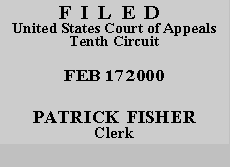

| UNITED STATES OF AMERICA,
Plaintiff-Appellee, v. ALEX YUNG, Defendant-Appellant. |
|
Alex Yung appeals from the district court's denial of his amended motion, filed pursuant to Fed. R. Crim. P. 41(e), for money damages in connection with a cost bond and the forfeiture of certain property following his conviction on charges of conspiracy to defraud the federal government. He raises two arguments on appeal: 1) notice of the forfeiture did not comport with due process, and 2) the district court's equitable decision to deny damages for the loss of the cost bond was based on the erroneous conclusion that appellant's previous tax liability was voluntarily written off by the Internal Revenue Service.
We review appellant's due process argument de novo. See United States v. Clark, 84 F.3d 378, 381 (10th Cir. 1996). After review of the parties' briefs on this issue, together with the applicable law, we conclude that the district court correctly decided this point. Therefore, we affirm the district court's decision on the due process issue as set forth in its order dated August 17, 1998.
Appellant's second argument is newly raised on appeal, and was not presented to or considered by the district court. We decline to consider it here. See Walker v. Mather (In re Walker), 959 F.2d 894, 896 (10th Cir. 1992). Appellant raises no other challenges to the district court's equitable determination of his claim regarding the cost bond.
Accordingly, the judgment of the United States District Court for the District of Kansas is AFFIRMED.
Entered for the Court
Circuit Judge
*. This order and judgment is not binding precedent, except under the doctrines of law of the case, res judicata, and collateral estoppel. The court generally disfavors the citation of orders and judgments; nevertheless, an order and judgment may be cited under the terms and conditions of 10th Cir. R. 36.3.